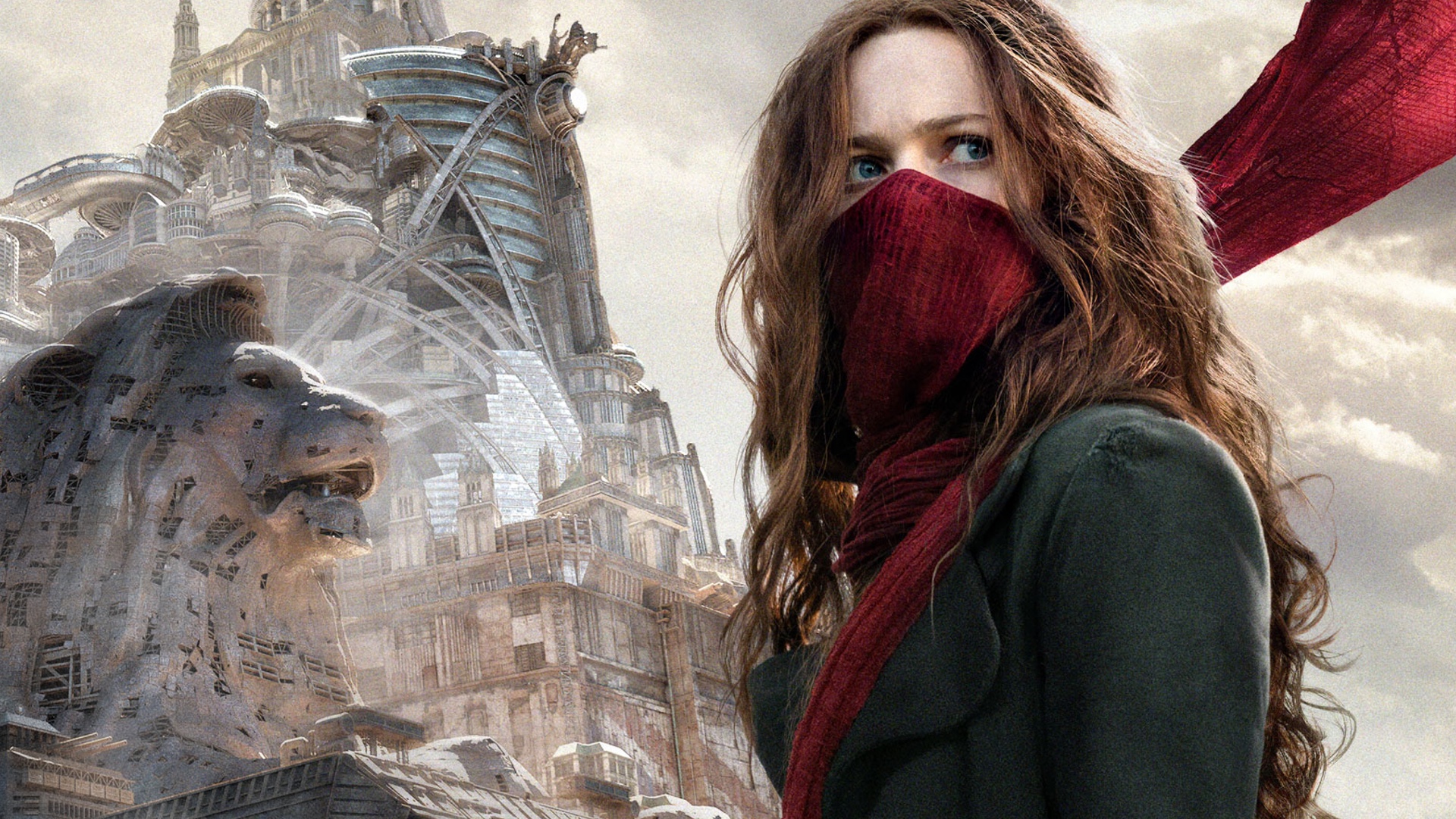The YA movie market has pretty much entirely died out in recent years, but that didn’t stop Universal and producer, Peter Jackson from trying to revitalize it during the Christmas season with Mortal Engines, a film adaptation of Philip Reeve’s well-received fantasy/steampunk novel of the same name. Founded on the concept of a post-apocalyptic future, wherein recognizable cities and towns in Europe have begun moving around on motorized rigs, consuming any settlements in their path to accumulate more resources, Mortal Engines certainly presented a good degree of potential for a big screen translation, particularly with Middle-earth adaptation mastermind, Peter Jackson becoming involved with the project, which seemed poised to give the story the blockbuster treatment that it demands.
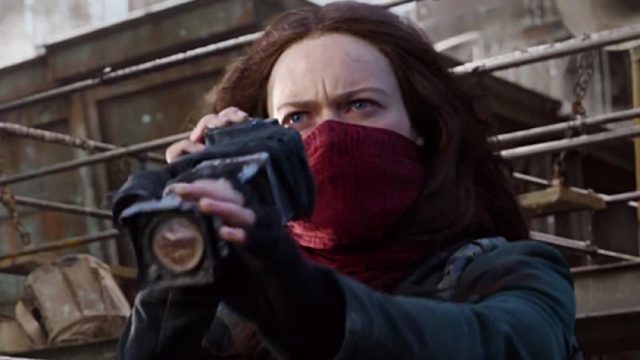
So what went wrong? Well, Mortal Engines is allegedly the biggest and most expensive box office bomb of 2018, incurring losses for Universal that apparently range around the $150 million mark. Ouch. This is a shame, since Mortal Engines really is a stunning technical achievement in many respects, boasting an incredible soundtrack and often awe-inspiring visuals, which does the source novel’s intricate imagination and structuring proud. Despite that however, it is very clear that the film adaptation of Mortal Engines is lacking something that it really needs during the especially crowded Holiday movie period in particular (which was worse than ever in 2018, due to no Star Wars movie releasing during this past December!), and that’s a sense of personality. For all of its beauty, Mortal Engines feels far too hollow and workmanlike, and that’s not helped by the difficult adaptation process behind the story, which leaves the movie version feeling more like an absurd teen soap than a truly substantial adventure.
Beyond a handful of distinct characters, such as female lead, Hester Shaw (who is naturally all over the posters and marketing, since she has the most recognizable face), and token resistance leader, Anna Fang, Mortal Engines doesn’t manage to craft that interesting of a cast. Male lead, Tom Natsworthy for example is every single wet-behind-the-ears accidental hero that spends the entire first half of the movie bitching and moaning, only to inexplicably save everyone’s bacon past the halfway point. Hugo Weaving meanwhile is stuck playing a stock villain who initially has shades of interesting plotting, appearing initially charismatic, welcoming and genuinely concerned for the people of his post-apocalyptic, mobile London, but past the intro, he quickly degrades into becoming a cartoon villain with an idiotically simple agenda.

Ironically, the big standout among the cast is Stephen Lang as Shrike, a robotic ‘Stalker’ that Hugo Weaving’s lead villain, Thaddeus Valentine sends after Hester and Tom at one point. Despite being in a machine body, Shrike is the one character with actual personality, complete with an effectively tragic backstory, and surprising motivations. That’s why it’s extra frustrating that Shrike doesn’t fit into this movie’s story very effectively, and is eventually dropped from it without much in the way of consequences for any of the leads. Icelandic actress, Hera Hilmar is probably the closest thing we get to another standout as Hester Shaw, but even she can only do so much with a script that just doesn’t give her anything truly meaty to work with.
The biggest testament to the failings of the shallow characters in the Mortal Engines movie is a laughably forced and non-sensical romance subplot between Hester and Tom, which only feels like it’s there because YA movie law seems to demand it. In fairness, Tom and Hester do eventually have a romance in the source novels too, but it’s nowhere near as rushed and undercooked as it is in this movie. Speaking of undercooked, just about all of the major lead personalities from the Mortal Engines book do show up in this movie, but unless you’ve read the book, and are very familiar with this universe in prose, you’ll have no idea who many of these personalities even are in this film adaptation! It’s hard to really dig into anything here, because the characters don’t have any real development or personality in too many instances, and are just doing and saying whatever the script demands at any given point. I can’t tell you anything about these people! Again, it’s very ironic that the robot man is the main exception to this rule too!
The Mortal Engines book has a very extensively crafted plot that spans a pretty thrilling literary adventure, an adventure that continues to worthy effect in three subsequent follow-up books. As you can imagine, several key story turns from the Mortal Engines source novel are removed or streamlined in the film adaptation, which is often par for the course in book-to-film translations. In having to take out many key developments from the rather intricate book however, the film adaptation of Mortal Engines often feels blatantly hacked to bits when it really shouldn’t, offering what barely passes as a Cliff’s Notes for the original book’s events, and yet still clocking in at just over two hours. It’s certainly not impossible to adapt meaty fantasy books to the big screen with great success, as many of the latter Harry Potter movies prove for example, but Mortal Engines definitely doesn’t translate nearly as well to film, where its big screen storytelling somehow feels both bloated and rushed at the same time.
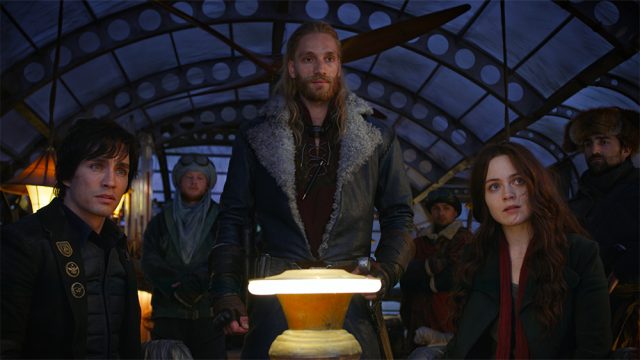
The over-arching concept behind Mortal Engines remains strong in the movie medium however, and there really is a solid storyline screaming to get out here. When it comes down to it though, Mortal Engines probably should have been adapted as a televised miniseries, not a two-hour theatrical movie. There’s just too much intricate plot structuring in the source story, leading to a sense of awkward pacing that has the film adaptation of Mortal Engines either dragging its feet when it needs to be exciting, or glossing over developments that really needed more time in the cooker. This results in a storyline that feels frustratingly impenetrable, with so much lost potential in the move to the big screen. The viewer never quite feels fully welcome in this world, forced to feebly try and wrap their heads around a lumbering monstrosity of overstuffed plot engineering, while only being able to work with half of the narrative schematics.
Despite Lord of the Rings and The Hobbit trilogy director, Peter Jackson’s name being used to sell Mortal Engines in most of its marketing, the movie is actually directed by Christian Rivers, a frequent artistic collaborator of Jackson’s, who has done art and visual work for several Peter Jackson-directed movies such as 2005’s King Kong remake, Jackson’s film adaptation of The Lovely Bones, and of course all six of Jackson’s Middle-earth adaptations. Rivers is making his feature film directing debut with Mortal Engines, and boy is he in over his head here!
Rivers’ long history of working as a visual effects artist and art supervisor for Peter Jackson probably explains why Mortal Engines looks amazing, but too often lacks a real sense of depth or character. It’s pretty evident that Rivers is most interested in playing with the settings and effects in Mortal Engines, but that quickly gives this film adaptation a rapid and debilitating sense of ‘George Lucas Syndrome’, namely creating an imaginative world that should be engaging, but never truly finds an opportunity for the audience to relate to anything. Instead, Mortal Engines often unfolds like a protracted video game cutscene, except even modern video game cutscenes don’t struggle this much to craft relatable and immersive narratives in most cases, even with the advantage of allowing the player to proceed the story at their own pace during the actual gameplay!
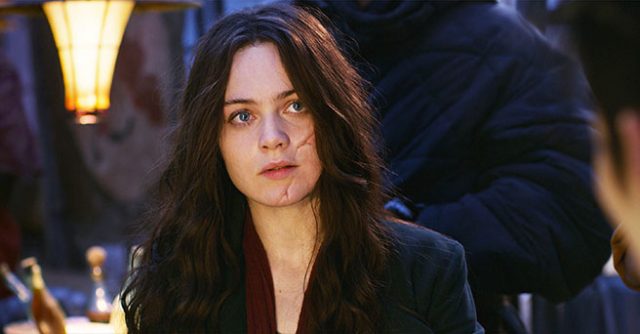
To be fair, there are some moments of solid directing in Mortal Engines, so it’s not like Rivers is completely inept as a first-time feature director here. It is easy to get the sense that Peter Jackson still had quite a bit of influence on the project’s direction, especially since Rivers was apparently hand-picked for the directing job by Jackson himself, but Rivers still does seem to have an eye for large-scale action, which does create a few genuinely thrilling moments here and there. Overall though, Mortal Engines can only be so engaging when you can’t emotionally or intellectually invest in what’s going on, leaving this film adaptation best enjoyed by people who are already die-hard fans of the book. Even then however, fans of the source novel will probably just miss the more developed and justifiably complex plot progression from the book.
Junkie XL, a.k.a. Tom Holkenborg, who is rapidly becoming one of the coolest and most talented music composers that Hollywood has to offer, oversees the soundtrack of Mortal Engines, and that’s a great thing! Holkenborg composes a pretty strong score for Mortal Engines, as you can imagine, one that feels grinding, loud and imposing in all the right ways. The over-arching hook of mobile cities that consume each other can constantly be felt throughout the music suite, which perpetually exudes the impressive scale of such a concept, with its lumbering instrumental compositions that almost sound like a larger-than-life mythical engine themselves. A soundtrack like this really deserved to be in a better movie, frankly, because it’s one of the best YA movie soundtracks composed to date! That’s why it’s a shame that very few people are ultimately going to experience it, considering Mortal Engines’ box office misfortune.

The rest of the audio engineering and sound mixing is similarly impressive, especially during the London set pieces, which feel creaky, monstrous and constantly foreboding, despite the outwardly pleasant visual sheen. There’s a relentless air of menace, suspense and intrigue in the sound design of Mortal Engines, which is certainly working overtime to try and compensate for the fact that there’s virtually no sense of real drama or emotion in the actual character dialogue or storytelling. Again, audio engineering on this level really deserved to be in a better blockbuster. Instead, it’s stuck desperately trying to elevate a movie that feels too hollow to truly care about, ultimately becoming another dimension of a cool fantasy world that just can’t muster up the enthusiasm to truly let the audience into it.
Here we come to what’s arguably the best part about Mortal Engines, its visuals. For all of its character and storytelling failings, Mortal Engines is at least gorgeous to look at, constantly bringing the world of the source novel to wonderful life on the big screen. There’s a ton of intriguing detail and imagination throughout the world of the book, and much of that does get translated to the film adaptation as well. It’s no exaggeration to say that this is probably the best-produced YA movie that Hollywood has delivered to date, with its sprawling environments, epic scope and consistently visually arresting set design. Again though, this is downright tragic, since all of these inspired, breathtaking visuals really deserved to be in a better movie, just like the comparably superb soundtrack. The outstanding visual elements will at least keep viewers engaged when the narrative frequently fails to, but they deserved to be paired with a genuine sense of high adventure and spectacular drama, which just isn’t truly on offer in Mortal Engines‘ film adaptation.
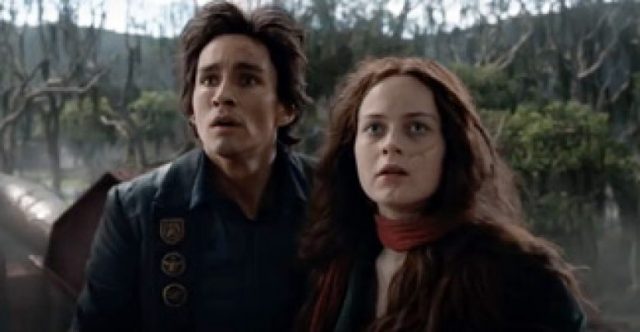
I also happened to see Mortal Engines in 3D, and even the 3D manages to be quite good for the most part! The 3D presentation adds even more impressive scope to the many wide shots and sprawling landscapes of the world behind Mortal Engines, adding a potent degree of extra immersion that makes a 3D ticket well worth springing for. The movie is still a visual spectacle when watched flat in 2D, especially on larger IMAX screens, but you do get the most out of the visuals when you bring a pair of 3D glasses. The world that’s been created here is so impressive, and that at least does invite the prospect of a franchise to keep expanding the impressive-sounding lore and history throughout the Mortal Engines universe. As you can imagine however, this movie bombing at the box office means that this is no doubt the only glimpse we’re going to get of this world on the big screen. At least it’s gorgeous while it lasts though!
Mortal Engines looks and sounds amazing, but it’s ultimately a bunch of empty blockbuster window dressing spread across a foundation of weak characterization and impenetrable storytelling. This is a textbook example of a style-over-substance blockbuster, which would be perfectly acceptable, had the writing and direction actually managed to be entertaining and heartfelt. In the end though, Mortal Engines is completely done in by its total lack of personality, which is made worse by the insanely misguided decision to release it during the especially crowded December 2018 movie period!
Compounding the misfortunes of Mortal Engines is the fact that even its impressive technical achievements are frequently overshadowed, since it ended up competing with the even more technically groundbreaking Spider-Man: Into the Spider-Verse, which actually does have humour, heart and personality in spades! Pair that with the fact that yet another technical milestone for cinema, Aquaman released just a week afterward, and you have even Mortal Engines’ best accomplishments outpaced and outdone on every level. Had Universal delayed this movie to, say, April, it might have stood a better chance at possibly breaking even at the box office, at the very least, but it seems like hubris may have gotten the best of the studio here.
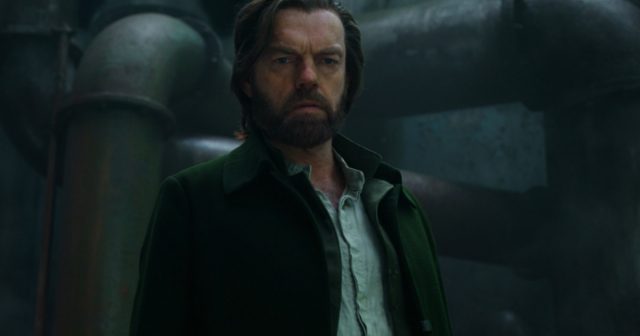
In the end, it’s really not difficult to see why Mortal Engines is the biggest box office bomb of 2018. The odds were against it from the get-go, since it’s trying to adapt yet another post-apocalyptic YA novel storyline, a movie market that’s more or less dead as disco by this point. When that’s paired with the frequent shortcomings of the writing and direction throughout Mortal Engines’ film translation to boot, you have a failed blockbuster that’s pretty much dead-on-arrival, killing this prospective film franchise in its crib. Needless to say, if you’re looking for a memorable fantasy/steampunk saga about mobile cities that devour each other, you should stick with the book. You don’t get the gorgeous visuals that way, but at least you do get a storyline that doesn’t feel both watered-down and hacked to pieces!

